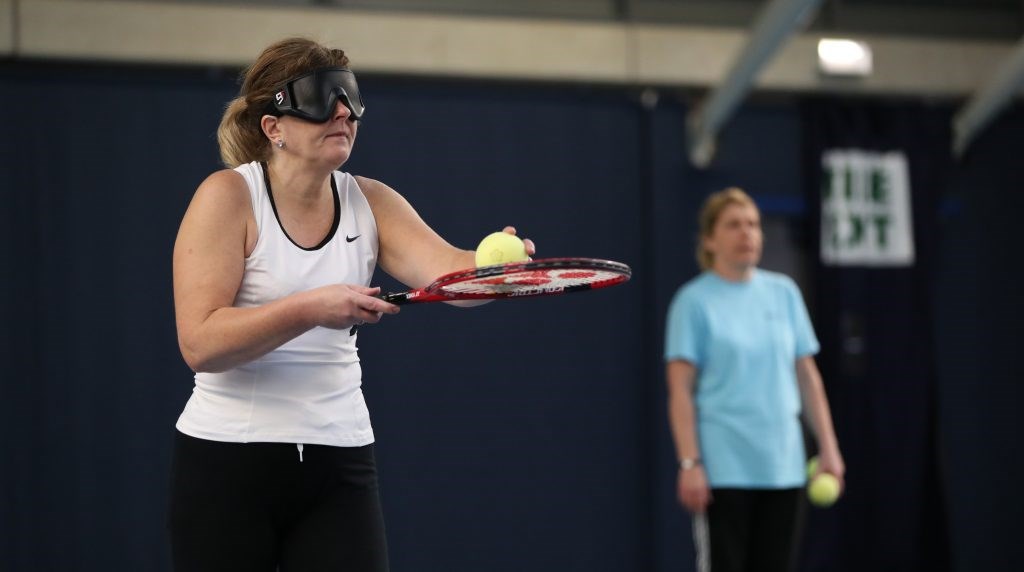Disability tennis

We pride ourselves on being a world leader in opening tennis up for disabled people. We want to make tennis as accessible and enjoyable for everyone by identifying and addressing issues that may create barriers to disability inclusion.
It’s our aim to support disabled people with fairer and more equal choices to play tennis in their own way.
In Great Britain, our Open Court programme and Player Performance Pathways are helping more people than ever play wheelchair, deaf, visually impaired and learning disability tennis, amongst many other different formats of the game, from the grassroots to the elite international level.
Find out more about the work we’re doing to grow disability tennis and support people across Britain in playing and enjoying our sport.
Wheelchair tennis is fully inclusive for anyone with a physical impairment. We’re committed to opening the sport up to as many people as possible with the help of our partners WheelPower, LimbPower and CP Sport.
Our Wheelchair Pathway is made up of a collection of programmes and initiatives, each with their own support structure to get more people on court and playing tennis.
In Great Britain we’ve had great success on the international stage and through our Performance Pathway we have supported some of the biggest stars in the game – such as Alfie Hewett, Gordon Reid, Lucy Shuker, Andy Lapthorne and many more – to win Paralympic medals, Grand Slam titles, the World Team Cup, reach the top of the world rankings and compete on the ITF Wheelchair Tennis Tour.
Through our Performance Competitions Calendar, we are hosting more wheelchair competitions than ever before – giving more players the chance to play and compete regularly on home soil and raising awareness of the sport – including the ITF Super Series event at the British Open Wheelchair Tennis Championships, as well as tournaments alongside the grass court season.
Find out more about playing wheelchair tennis
Deaf tennis is for people who have impaired hearing. The sport requires little adaptions and has a long history in tennis in Britain.
Working with our partners UK Deaf Sport, our goal is to encourage more people with hearing impairments to pick up a racket and provide them with opportunities to play and compete at all levels.
We host an annual national championship and has a national Deaf tennis development squad who train and compete in various Deaf European and World tennis championship events, including the Deaflympics.
Find out more about playing deaf tennis
Visually impaired (VI) tennis is the fastest growing visually impaired sport in the UK – with ambitions to become a Paralympic Sport in the future.
VI tennis is an adapted form of the game for people who are blind or partially sighted. The main adaptations include foam balls with a bell inside, tactile lines and the court size, which is dependent on the severity of the impairment, with five different classifications ranging from B1 to B5.
Together with our partners British Blind Sport and RNIB we’re making the sport more accessible for people with visual impairments. Through the Open Court programme there are more venues than ever offering VI tennis across Great Britain.
We run a thriving regional competition series throughout the year as well as our annual National Championships. We also have a national VI tennis squad who train and compete in various IBTA World Tennis Championship events across the world – all supported by the LTA.
Find out more about playing VI tennis
A learning disability can be classed as mild, moderate, severe or profound, and can include conditions such as?Down’s Syndrome and Autistic Spectrum Disorder?(ASD).
With the support of our partners at Special Olympics and MENCAP, we provide people with learning disabilities the access and opportunity to play and enjoy tennis across the country. It is the largest impairment group that our Open Court programme venues engage with and support at around 60% of players.
As a result, we’re one of the leading nations in the world when it comes to the performance game – regularly finishing amongst the top medal winners at the at Special Olympics and Virtus World Tennis Championships.
Para standing tennis is a new format of tennis for people with physical ambulatory impairments who play without using a wheelchair.
The sport is supported by the LTA, ITF and others with over 300 players from 21 different countries. The goal is to become a certified Paralympic sport.
Standing categories in table tennis and badminton are already recognised at the Paralympics, and we are pursuing plans to grow the game domestically.
As part of our work to make tennis more inclusive, we’re providing opportunities for people with long-term health conditions to get involved in our sport. These include players with chronic mental or physical health conditions that require ongoing management and treatment over a period of years.
Through our Open Court programme we have set up several specific initiatives around the country to support players with conditions such as Dementia, Parkinson’s, and mental health issues.
We have also adopted a new walking format of the game called walking tennis, with a growing list of venues throughout Great Britain now offering this as an accessible format. Walking tennis is a form of tennis with a few tweaks: you can let the ball bounce twice for extra time, can play on a smaller court and use modified equipment and players can’t run or jump.
